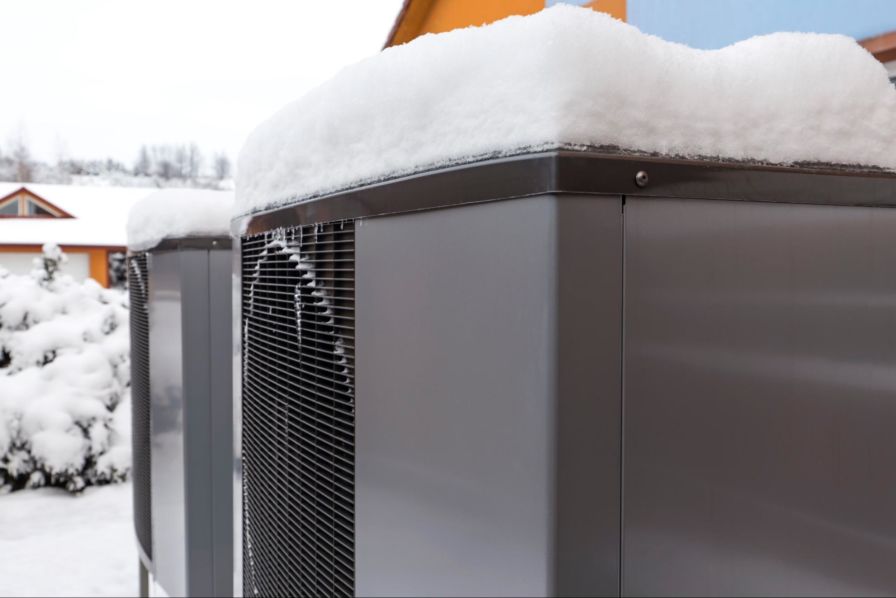How Does a Heat Pump Work in the Winter?
September 19, 2024

During the sweltering summer months, a heat pump functions like an air conditioner, expelling hot air from your home to keep it cool. However, as the seasons change, so does the role of your heat pump. But how exactly does a heat pump transition to providing warmth in the chilly winter months?
In winter, a heat pump reverses its operation. Instead of removing heat from your home, it captures even the slightest warmth from the cold outdoor air and efficiently transfers it inside. This might seem surprising given the freezing temperatures outside, but heat pumps are designed to utilize even minimal outdoor heat effectively.
Interested in learning more about how heat pumps can efficiently keep you warm in winter and cool in summer? Keep reading as we delve into:
- How a heat pump works
- Maintenance requirements
- Efficiency in cold temperatures
- Benefits of a heat pump year-round
By the end of this guide, you’ll understand why a heat pump might be the ideal solution for your home’s heating and cooling needs.
Local Heat Pump Installation
Ready to have a warm, energy-efficient home this summer? Patrick Riley Services can handle all your heat pump installation needs. We offer upfront, honest pricing and a 100% satisfaction guarantee on all our work, so you know you're in good hands.
How a Heat Pump Works
As stated above, a heat pump takes heat from the cold air outside and transfers it into the home. It may seem strange that there would be any warmth in the winter air, but there is! A heat pump can soak up heat even when the air outside is 5°F or lower.
A compressor inside the heat pump uses electricity to further increase the temperature of the air it captures from the outside. This process allows warm air to penetrate your home in the winter and keep you comfortable.
In the hotter months, the heat pump works the same but with the opposite effect. It uses a similar process to push warm air outside the home so you feel cool.
Maintenance Requirements
It's in your best interest to maintain your heat pump regularly. A well-maintained heat pump consumes 10%-25% less energy than a neglected one, which will save you money. Additionally, keeping up with maintenance will prolong the life of your heat pump.
Some of the maintenance steps you can take on yourself are:
- Clean or change filters monthly or as needed.
- Read the manufacturer's instructions and follow any maintenance tips provided.
- Clean outdoor coils whenever they appear dirty.
- Once a season, turn off the power to the fan to wipe it down.
- Ensure the outdoor unit doesn't have any clutter or vegetation around it.
- Straighten any fins that get bent.
Efficiency in Cold Temperatures
So, just how efficient can a heat pump be in the winter? Some people worry that if they live in a climate that gets exceptionally cold, a heat pump isn't the best choice for their home. However, heat pumps are a very efficient energy source overall.
However, the colder the temperature, the more energy the heat pump needs to use, making it less efficient. Still, there are cold climate heat pumps (or cold weather heat pumps) that have extra features that allow them to be efficient in temperatures below -20°F.
Benefits of a Heat Pump Year-Round
Heat pumps are becoming more popular due to their many benefits. More homeowners are recognizing the return on investment for this house upgrade.
Specifically, some of the benefits of heat pumps are:
- Comfort all year long. You no longer need two separate systems. Instead, this single unit helps keep your home's temperature comfortable year-round.
- Improved air quality. Many heat pumps come with air filters that clean the indoor air while heating or cooling the home.
- Cost savings. Heat pumps are an energy-efficient option. They use less electricity overall because they primarily transfer air rather than generate it. This means that a heat pump will help you save on your energy costs.
- Longevity. A well-maintained heat pump system can last 15-20 years, making it a cost-effective investment.
- Increased property value. Because heat pumps are the latest innovation, they can help increase your property value if you choose to sell your home.
- Eco-friendly. Heat pumps are eco-friendly as they produce less carbon emissions.
- Reduced noise. Unlike many air conditioners, heat pumps are systems that won't be disruptive to your home.
Although a heat pump may have some upfront costs, it's an investment that will pay for itself in the long run and leave your home comfortable and warm all winter long.
Get Your Heat Pump Quote Today
Interested in learning how much a heat pump installation will cost? The Phoenix pros at Patrick Riley Services offer flexible scheduling options, so we can provide a quote at a time that works best for you. And our flexible financing options will help you take away all the stress of affording your heat pump!
Get 10% off (Up to $150)

Ty Lindsay is the Director of Field Operations at Patrick Riley | Isley’s and a 15-year veteran of the plumbing and HVAC trades. In 2010, Ty earned his Journeyman’s plumbing license. He became a Master Plumber five years later and earned his Journeyman HVAC technician’s license that same year. Ty’s breadth of knowledge in plumbing and HVAC includes both residential and commercial work. He’s been a loyal member of the Patrick Riley | Isley’s team since 2016.
- Posted in:
